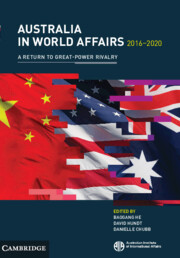Book contents
- Frontmatter
- Contents
- List of tables and figures
- Preface
- About the AIIA
- Contributors
- Abbreviations
- 1 Australian responses to great-power rivalry
- Part I The domestic politics of Australian foreign policy
- Part II Global issues
- Part III Regional issues
- 11 Reimagining Australia’s regional security for the Indo-Pacific century
- 12 Australia’s security interests in South-East Asia and the Pacific
- 13 Australia’s engagement with ASEAN
- 14 Australian foreign economic policy and the Belt and Road controversy
- Index
12 - Australia’s security interests in South-East Asia and the Pacific
from Part III - Regional issues
Published online by Cambridge University Press: 25 October 2024
- Frontmatter
- Contents
- List of tables and figures
- Preface
- About the AIIA
- Contributors
- Abbreviations
- 1 Australian responses to great-power rivalry
- Part I The domestic politics of Australian foreign policy
- Part II Global issues
- Part III Regional issues
- 11 Reimagining Australia’s regional security for the Indo-Pacific century
- 12 Australia’s security interests in South-East Asia and the Pacific
- 13 Australia’s engagement with ASEAN
- 14 Australian foreign economic policy and the Belt and Road controversy
- Index
Summary
Between 2016 and 2020 Australia’s foreign and strategic policy became more tightly focused on South-East Asia and the Pacific, which it identified as its ‘immediate region’. This reflected the government’s concern about the strategic consequences of emerging great-power competition, and particularly the assumption that China’s presence in these subregions equated to greater influence. While this assumption influenced Australia’s strategic and foreign policy choices, it was largely untested. Australia responded by increasing its engagement in both subregions to solidify its relationships, bolster its influence, and reassure its regional partners of its continued commitment. But Australia had different geostrategic perceptions and interests than South-East Asia and the Pacific. Its failure to acknowledge the agency of these neighbours sometimes led to counterproductive strategic and foreign policy decisions.
Keywords
- Type
- Chapter
- Information
- Australia in World Affairs 2016–2020A Return to Great-Power Rivalry, pp. 161 - 173Publisher: Cambridge University PressPrint publication year: 2024

